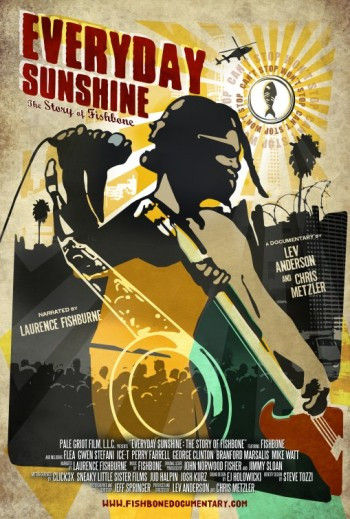Everyday Sunshine – The Story of Fishbone (A PopEntertainment.com Movie Review)
- PopEntertainment

- Oct 5, 2011
- 4 min read
Updated: Jun 23, 2024

Everyday Sunshine – The Story of Fishbone
EVERYDAY SUNSHINE – THE STORY OF FISHBONE (2011)
Featuring Norwood Fisher, Angelo Moore, Kendall Jones, Chris Dowd, “Dirty” Walter A. Kibby II, David Kahne, Keith Morris, Ice-T, Gwen Stefani, Flea, Mike Watt, Branford Marsalis, Tim Robbins, Vernon Reid, Eugene Hutz, Perry Farrell, Les Claypool, Tony Kanal, Bob Forrest and George Clinton.
Narrated by Lawrence Fishburne.
Written by Lev Anderson and Chris Metzler.
Directed by Lev Anderson and Chris Metzler.
Distributed by Pale Griot Films. 107 minutes. Not Rated.
Fishbone was one of those bands that got away. When they exploded out of South Central LA in the mid-80s, they were like nothing else out there. They were an all black band that played a dizzying array of styles, punk to ska, metal to R&B and pretty much everything in between. They were groundbreaking. They were fantastic artists. They were tight musicians. They had critical acclaim. They had a hypnotic front man. They put on legendary live performances.
Sadly, they never quite found the following that in hindsight nearly everyone agrees that they deserved.
Now, nearly 30 years into the band’s career, they are still chasing the public adulation that got away. It is a triumphant and at the same time sort of sad circumstance, which is shown right off the bat in this fascinating documentary when the film segues from a triumphant, sold-out 1992 theater show when the band was at its peak of potential to today, when an older version of the band, with only two original members, starts playing on an Eastern European courtyard for a couple dozen elderly people on lawn chairs.
Fame is a fickle mistress. Particularly so when you never quite catch up to her.
Many artists sing the praises of Fishbone – both contemporaries and those influenced by Fishbone, many of whom ended up being more popular than the band they are soliloquizing. Included in this role call are Flea from Red Hot Chili Peppers, Ice-T, Gwen Stefani (and the rest of the members) of No Doubt, Branford Marsalis, George Clinton from Parliament-Funkadelic, Perry Farrell of Jane’s Addiction, Eugene Hutz of Gogol Bordello, Les Claypool of Primus and Vernon Reid of Living Colour. The band’s early producer and well-known Columbia Records exec David Kahne says that it is one of his true regrets in the music industry that he was never able to figure out how to make Fishbone a hit.
Many theories are thrown out here. Some people say that the complete democracy of the band – there were usually about eight or nine players in the band and each had equal say – caused friction. Some people suggest that the band’s recorded output never quite captured their magical concert vibe. Some suggest their song stylings were a little too complex for pop radio. Some people think the band was just too far ahead of its time. Perhaps funk-master George Clinton nailed it when he suggested that Fishbone were simply too white for black audiences and too black for white audiences.
Whatever the explanation is, Everyday Sunshine does a fine job of reintroducing the band’s music to the world, as well as giving a fascinating view into the highs and lows of the band.
With a bright look made up of talking heads, vintage footage and clean illustration, Everyday Sunshine takes us from the members’ formation as teens. The theory is that the group’s wide variety of influences come from the fact that they were amongst the first children bussed from South Central LA to go to school in the San Fernando Valley, finding the kids immersed in both the R&B and rock cultures.
Eventually, as the superstardom that was long predicted for the band slips away and these longtime friends fracture in some delightfully non-Behind the Music ways. It isn’t drugs, it is mostly personality clashes and artistic differences, but there is still room in the story for fantastic stories of religious cults and kidnapping charges.
In the meantime, the two faces of the band – the original member and bassist Norwood Turner and charismatic but occasionally odd front man Angelo Moore – continue trying to keep the band’s legacy going, despite often finding themselves at odds with each other. They keep trying for that brass ring long after the world has mostly moved on, as the film shows in scenes that are both kind of funny (a Spinal Tap-ish scene where they go to a store for a record signing and no one shows up) and very sad (an adult Moore has to move back in with his mother when he can’t afford to pay for his not overly luxurious house due to scarcity of gigs.)
The filmmakers and interviewees occasionally overdo it with the credit for the band – none of them mention the similar musical boundaries being busted down by other contemporary black (or mixed race) groups like The Bus Boys, Bad Brains, The Specials, The Beat and Living Colour (this one is particularly surprising, since LC lead guitarist Vernon Reid is pretty extensively interviewed for the film.)
However, as a tribute to an artistic force that has not received their due – and as a fascinating look at friendship – Everyday Sunshine is a visual and narrative party at ground zero.
Dave Strohler
Copyright ©2011 PopEntertainment.com. All rights reserved. Posted: October 5, 2011.
#TonyKanal #GeorgeClinton #JanesAddiction #gogolbordello #VernonReid #TheStoryofFishbone #EverydaySunshine #GwenStefani #LesClaypool #KeithMorris #DavidKahne #LawrenceFishburne #EugeneHutz #LevAnderson #BranfordMarsalis #NoDoubt #LivingColour #DirtyWalterAKibbyII #BobForrest #Flea #ChrisMetzler #IceT #PopEntertainmentcom #MikeWatt #davestrohler #Primus #RedHotChiliPeppers #ParliamentFunkadelic #KendallJones #TimRobbins #Fishbone #ChrisDowd #PerryFarrell #AngeloMoore #moviereview #NorwoodFisher











Comments